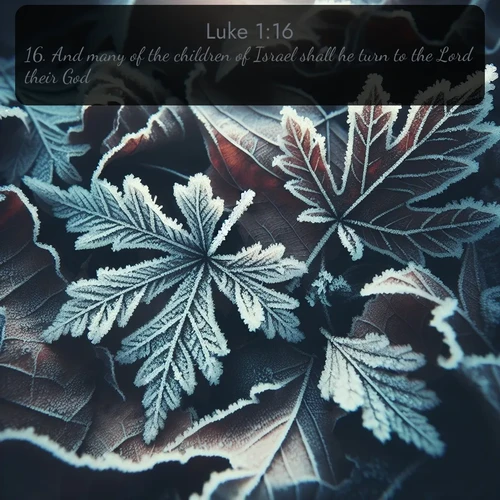Gospel of Luke 1:16 plusieurs versions / traductions
English Bible Translations
16. And through him great numbers of the children of Israel will be turned to the Lord their God.
German Bible Translations
16. Und viele von den Kindern Israel wird er zu dem Herrn, ihrem Gott, zurückführen.
French Bible Translations
Versions with Strong Codes
Luke 1 / KJV_Strong16. And[G2532] many[G4183] of the[G3588] children[G5207] of Israel[G2474] shall he turn[G1994] to[G1909] the Lord[G2962] their[G846] God.[G2316]
Strong Code definitions
G2532 kai/kahee apparently, a primary particle, having a copulative and sometimes also a cumulative force; and, also, even, so then, too, etc.; often used in connection (or composition) with other particles or small words:--and, also, both, but, even, for, if, or, so, that, then, therefore, when, yet.
G4183 polus/pol-oos' including the forms from the alternate pollos; (singular) much (in any respect) or (plural) many; neuter (singular) as adverbial, largely; neuter (plural) as adverb or noun often, mostly, largely:--abundant, + altogether, common, + far (passed, spent), (+ be of a) great (age, deal, -ly, while), long, many, much, oft(-en (-times)), plenteous, sore, straitly. Compare 4118, 4119. see G4118 see G4119
G3588 ho/ho, including the feminine to to in all their inflections; the definite article; the (sometimes to be supplied, at others omitted, in English idiom):--the, this, that, one, he, she, it, etc.
G5207 huios/hwee-os' apparently a primary word; a "son" (sometimes of animals), used very widely of immediate, remote or figuratively, kinship:--child, foal, son.
G2474 Israel/is-rah-ale' of Hebrew origin (3478); Israel (i.e. Jisrael), the adopted name of Jacob, including his descendants (literally or figuratively):--Israel. see H3478
G1994 epistrepho/ep-ee-stref'-o from G1909 and 4762; to revert (literally, figuratively or morally):--come (go) again, convert, (re-)turn (about, again). see G1909 see G4762
G1909 epi/ep-ee' a primary preposition; properly, meaning superimposition (of time, place, order, etc.), as a relation of distribution (with the genitive case), i.e. over, upon, etc.; of rest (with the dative case) at, on, etc.; of direction (with the accusative case) towards, upon, etc.:--about (the times), above, after, against, among, as long as (touching), at, beside, X have charge of, (be-, (where-))fore, in (a place, as much as, the time of, to), (because) of, (up-)on (behalf of), over, (by, for) the space of, through(-out), (un-)to(-ward), with. In compounds it retains essentially the same import, at, upon, etc. (literally or figuratively).
G2962 kurios/koo'-ree-os from kuros (supremacy); supreme in authority, i.e. (as noun) controller; by implication, Master (as a respectful title):-- God, Lord, master, Sir.
G846 autos/ow-tos' from the particle au (perhaps akin to the base of G109 through the idea of a baffling wind) (backward); the reflexive pronoun self, used (alone or in the comparative 1438) of the third person , and (with the proper personal pronoun) of the other persons:--her, it(-self), one, the other, (mine) own, said, (self-), the) same, ((him-, my-, thy- )self, (your-)selves, she, that, their(-s), them(-selves), there(-at, - by, -in, -into, of, -on, -with), they, (these) things, this (man), those, together, very, which. Compare 848. see G109 see G1438 see G848
G2316 theos/theh'-os of uncertain affinity; a deity, especially (with 3588) the supreme Divinity; figuratively, a magistrate; by Hebraism, very:--X exceeding, God, god(-ly, -ward). see G3588
Prédications qui analysent les thèmes Évangile selon Luc 1
Thèmes : Annonciation; Visite de Marie; Naissance de Jean; Annonciation à Marie; Louange de MarieLa faiblesse apparente de la naissance de Jésus
Fil Rouge de la Bible 11a: Jésus de Nazareth sa naissance (Matthieu 1-3)
Related Sermons discussing Gospel of Luke 1
Themes : Annonciation; Visite de Marie; Naissance de Jean; Annonciation à Marie; Louange de MarieChristmas theme: Who was really waiting for Jesus?
Christmas / The Incarnation: The apparent weakness of the birth of Jesus is triumphant
Red Thread of the Bible 11b: The life of Jesus of Nazareth (Matthew 1 – 3)
Bible Red Thread 11a: Jesus of Nazareth His Birth (John 1)
see also: Bible Key Verses ; KJV Bible Images, BBE Bible images

